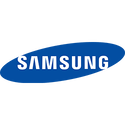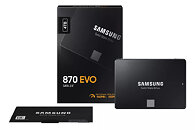Tuesday, January 19th 2021

Samsung Officially Announces 870 EVO SATA SSD Series
Samsung today has officially taken the lid off their latest consumer-oriented SATA SSDs, the 870 EVO. The 870 EVO series from Samsung don't push the maximum storage density ceiling on traditional SATA consumer drives, topping out at a maximum 4 TB, but they do achieve that ceiling whilst making use of Samsung's 128-layer TLC (Triple-Layer-Cell) NAND, which offers increased endurance (and higher theoretical performance than) more widespread QLC-based SSDs (of which Samsung launched the 870 QVO back in July 2020).
Samsung quotes SATA sequential read and write speeds of 560 MB/s and 530 MB/s respectively, with a "variable SLC" cache (which means it decreases in maximum size as the available free drive space decreases). The drives are also quoted at 98K IOPS Random Read, and 88K IOPS Write, and feature the company's Intelligent TurboWrite to maintain the interface's SATA 6 Gbps saturation as long as possible before sustained performance degradation appears. Samsung claims the 870 EVO also delivers a nearly 38% improvement in random read speeds over the previous 860 model, and quotes a (TBW) rating of 2,400 TB (or a 5-year limited warranty, whichever comes first) for its 4 TB model. The 870 EVO is available in either 256 GB, 512 GB, 1 TB, 2 TB, or 4 TB capacities, with the drives' RAM buffer scaling almost accordingly (512 MB DDR3 for the 256/512 Gb models, 1 GB for the 1 TB, 2 GB for the 2 TB drive, and 4 GB for the 4 TB one. Pricing starts at $49,99 for the 256 GB model; 500 GB for $79.99, 1 TB for $139.99; 2 TB for $269.99; and 4 TB for $529.99.
Source:
The Verge
Samsung quotes SATA sequential read and write speeds of 560 MB/s and 530 MB/s respectively, with a "variable SLC" cache (which means it decreases in maximum size as the available free drive space decreases). The drives are also quoted at 98K IOPS Random Read, and 88K IOPS Write, and feature the company's Intelligent TurboWrite to maintain the interface's SATA 6 Gbps saturation as long as possible before sustained performance degradation appears. Samsung claims the 870 EVO also delivers a nearly 38% improvement in random read speeds over the previous 860 model, and quotes a (TBW) rating of 2,400 TB (or a 5-year limited warranty, whichever comes first) for its 4 TB model. The 870 EVO is available in either 256 GB, 512 GB, 1 TB, 2 TB, or 4 TB capacities, with the drives' RAM buffer scaling almost accordingly (512 MB DDR3 for the 256/512 Gb models, 1 GB for the 1 TB, 2 GB for the 2 TB drive, and 4 GB for the 4 TB one. Pricing starts at $49,99 for the 256 GB model; 500 GB for $79.99, 1 TB for $139.99; 2 TB for $269.99; and 4 TB for $529.99.

44 Comments on Samsung Officially Announces 870 EVO SATA SSD Series
Having said that Samsung are not the only game in town now like they once were and there are other very good reliable options. They seem more like Intel too arrogant to respond to competition with better pricing. My next build most likely won't have Samsung SSD's.
In any case anecdotal evidence is essentially equivalent to a single user review. There are thousands for the drive, a majority positive. There's also professional reviews that reflect the same.
Using a single personal example to try and demonstrate that anything but Samsung is bad contradicts the mountains of evidence we have from both professional reviewers (including TPU itself) and user reviews. Just because you, a singular individual, has a problem, does not change that fact.
And it's not a new phenomena. SSD makers without any of their own vertical supply have been doing bait-and-switch for years:SSD shadiness: Kingston and PNY caught bait-and-switching cheaper components after good reviews - ExtremeTech
www.tomshardware.com/news/adata-xpg-sx8200-pro-controller-change
Right, must be nice living in a bubble.
And no, I don't read "Just buy it!" tomshardware, that publication is complete trash.
Yeah, what ADATA did was wrong but if buying Samsung gives you peace of mind you are a fool.
Also, what's the next best brand after Samsung? If we're talking something like 970 Pro equivalent drives. I don't care about sequential speeds, but I want my drives to handle the real world usage and I want that particular metric to be good.
TBH though you can buy almost any PCIe NVME drive and end user experience won't be that different. For average use you are really paying more for shaving off tiny fractions of a second.
Two different builds so very much doubt it.
Adata products it's best to not test lol
It's like Toyota (or Volkswagen) vs other brands, BMW's M3 vs other brands, Ford F150 vs other full size trucks. The market leaders have consistently proven themselves for decades.
I'm not saying you should always buy Samsung, Nvidia, ASUS and pay their respective taxes. But people who do so aren't wrong in their choice either.
Products always drop in price if they don't sell
50% off well I doubt that but 25% is not unusual on holiday/... sells.
This is why buying a brand blindly is a terrible idea. Every company has bad products or will have bad products. If you think samsung has had zero issues you'd be wrong as well: www.diskpart.com/articles/samsung-ssd-slow-down-4125.html
People who always buy one brand without first considering alternatives while putting their preconceived biases aside are indeed wrong, no ifs and buts about it.